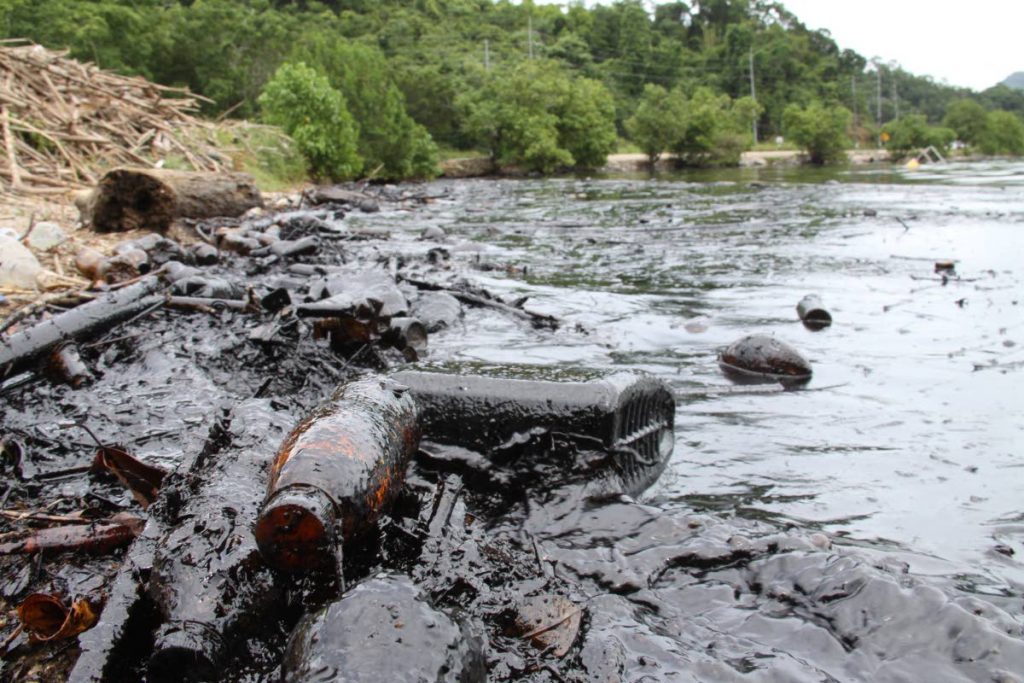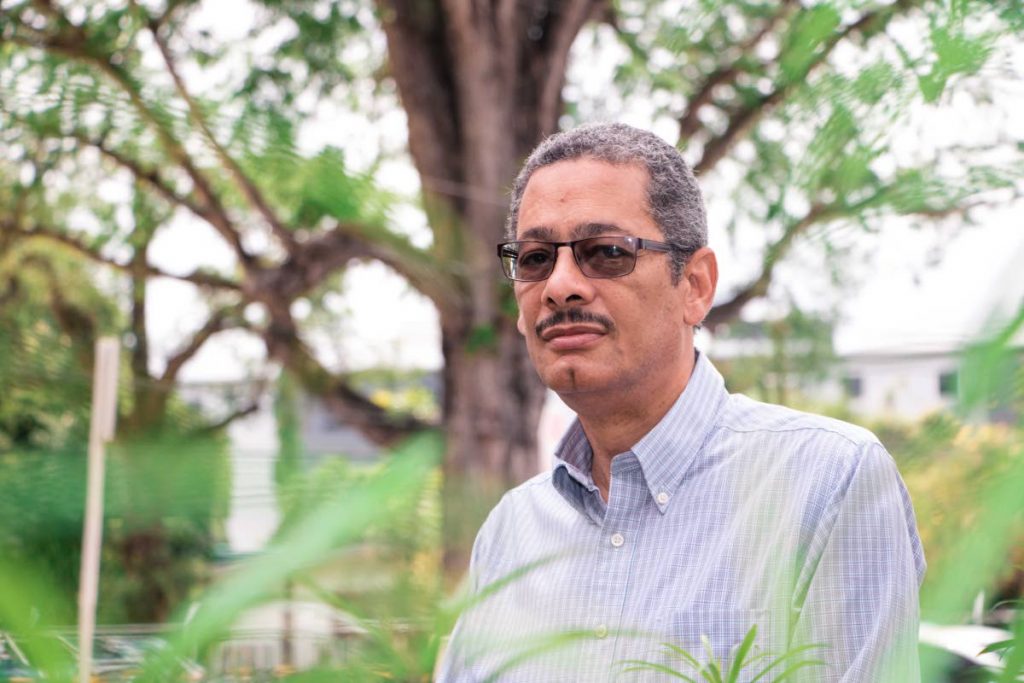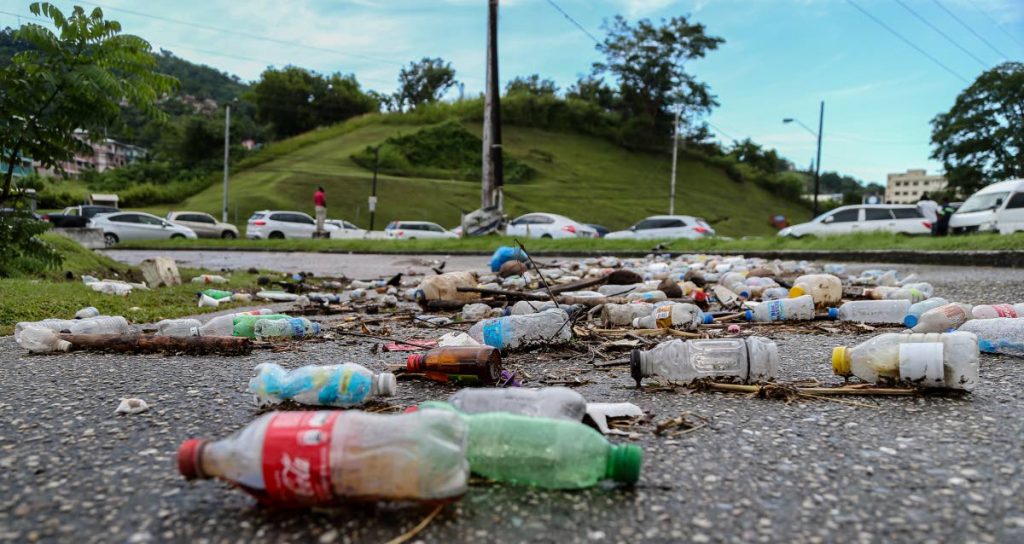Prof John Agard calls for quicker action on cutting carbon emissions

When he was younger, John Agard’s parents wanted him to be something practical – like a doctor. Instead – long before it was cool – he felt a visceral pull towards studying the environment. “Even as a boy my parents told me do medicine. But I was very passionate about environmental issues. I had opportunities to go to the UK and do all kinds of other things but I said no, it was really the environment I was passionate about,” he told Business Day recently.
In fact, after decades as one of the premier climate scientists in the world, it’s thanks to some of Prof Agard’s research that climate change is one of the hottest topics on the planet – which, incidentally, he’s also helped prove is getting warmer. Part of the UWI St Augustine Department of Life Sciences, he’s pioneered ground-breaking studies on global warming and as part of the Intergovernmental Panel on Climate Change (IPCC), serving as lead author of the chapter on small islands. He’s also been part of a 2007 Nobel Peace Prize winning team jointly awarded with former US vice president Al Gore for, the Nobel committee expounded, “their efforts to build up and disseminate greater knowledge about man-made climate change, and to lay the foundations for the measures that are needed to counteract such change.”
And now, just last month, he’s been appointed co-chair of the United Nations Global Sustainable Report 2023, handpicked by Secretary General Antonio Gutteres to oversee ways on how best the world can achieve the 17 sustainable development goals (SDGs) by 2030. He’s also been recognised by Caricom as one of the people in the region on the frontlines for promoting renewable energy as part of its energy personality series for Caricom Energy Month.
“When I got involved in a serious way in the climate issue, nobody was taking this on. The IPCC, is now in its sixth assessment. The assessments are five years apart. And it’s been a long while that this matter has been pushed and nobody was taking it on. It was only during the fourth assessment, (when we were) co-awarded the Nobel Prize, that was the first time it was taken on globally...The worry is once it’s acknowledged now, so late in the game, that hopefully it’s not too late to turn it back because (climate change is happening) faster and faster,” he said.
Despite his distinguished career, Agard remains charmingly humble, even in light of this latest honour. “It’s a little bit of a surprise to be asked to serve as co-chair. Essentially, each member country of the UN was asked to nominate their most eminent scientist. There are 194 countries in the UN. I was told all the UN agencies and (the World Bank group) also evaluated these nominations and they advised the Secretary General what they thought and he made the (final) decision himself and then wrote me a letter advising of his decision.” His co-chair is Prof Imme Scholz, the deputy director of the German Development Institute.
“I suppose they have to be gender-balanced and geographically-balanced and so on. That’s one of the issues of the sustainable development goals. SDG 5 is gender equality. Man can’t be favoured and I have very strong opinions on that matter. It’s something I have (advocated for) for years. There’s a glass ceiling and I see progress in the US with the new elections. But you know, I’m just tired hearing from men. That is absolutely so wrong. I have two daughters. And they are very smart and I can’t have them live in that kind of world. Because you are female you are disadvantaged. I talk about it all the time. So, I was very happy that they evaluated everybody and there are co-chairs – one male and female.”

The report is due in 2023 and work has already started.
“They’ve selected a number of people to come up with action items to tell us how to get there. They’ve been very careful with choosing these people on how to make this happen because this is the world we want. You can’t argue against any of these things. They are no-brainers.”
He has some added pressure to represent the red, white and black. “(The evaluators) told me ‘you’ve been involved in all these things to make this world happen so help us please.’ And if I said no I am too busy, I was warned that I would embarrass my country, so find the time. You’re not going to get paid but it’s important to the world, so find the time. No excuses,” he chuckled.
TT leading the world, falling short at home
While Agard represents TT at the highest levels of sustainable development and climate action discussions, he noted the considerable lack of policy implementation domestically.
“We are going slowly. In the budget in October there were five lines relating to climate action in the Finance Minister’s speech,” he said.
In his presentation, the Finance Minister noted the country’s commitment to reducing carbon emissions saying, “Climate action in support of our commitments of the Paris Agreement is being advanced with a view to achieving a reduction in overall emissions by 15 per cent from three sectors: power generation, transportation and industrial operations. Renewable energy will soon be delivering power to the electric grid.”
It’s not the light bulbs he promised in his 2020 speech, but TT’s climate manoeuvrability is awkward because the economy is based on fossil fuels but as a small island developing state (SIDS) the country is uniquely susceptible to the ravages of climate change – coastal erosion along the south and east coasts are stark reminders.
According to the Ministry of Planning’s Carbon Reduction Strategy (2015), TT’s biggest greenhouse gas (GHG) emissions come from the industrial sector, producing nearly 27 million tonnes annually, or 73 per cent. Electricity generation is 19 per cent, producing nearly seven million tonnes, and transport contributes eight per cent or about three million tonnes. To meet that 15 per cent goal, Government estimates it will cost US$2 billion, which would be funded through local investment as well as international green funds.
Agard noted that TT is the second biggest per capita emitter of GHGs despite being such a small country. “That makes the country look bad globally. We are emitting carbon dioxide 24 hours a day, seven days a week for 365 days for decades now. And they don’t like you to talk about it.” He noted the UK, which will be hosting the UN Climate Change Conference (COP 26) in Glasgow, Scotland next year, is advocating for higher levels of adherence among Paris Agreement signatories who have pledged carbon reduction. “Don’t just say 15 per cent. We know you can do better. Part of the politics is if you set your targets too high and you fall short you will get criticised. So, I think the approach in TT is to set your target low and if you exceed it you’ll get praised,” he said.
Caribbean islands on renewable energy road
Even though TT last year finally awarded a renewable energy project to a consortium including BP and Shell, scheduled for next year, that’s still miles behind the initiatives of other islands. Agard cited Jamaica and Barbados for their strides in incorporating renewable energy into their electricity generation. Jamaica, for example, has three wind farms, while Barbados has a solar rebate policy where people contributing excess power to the national grid get cheques instead of bills. He acknowledged the new project, including UWI’s contribution of 40 hectares of land in Orange Grove to facilitate a solar farm. “TT is in last place. When we did a graph of renewable energy from each country in the Caribbean, TT is at zero. Barbados has a solar farm and has a feed in tariff for a number of years so if you generate a surplus of energy you feed it into the grid and instead of getting a bill you get a cheque at the end of the month. Gosh. Wow! Why aren’t we doing that in Trinidad and Tobago? The idea in TT is if you are born in TT you are entitled to cheap energy because God is a Trini. That’s what people have told me,” he said wryly.
Last year, at the UN Climate Summit in New York, Caribbean leaders Mia Mottley of Barbados, Allen Chastanet of St Lucia and Andrew Holness of Jamaica, represented the region, advocating on behalf of SIDS around the world for sustainable financing models to help these countries combat the real existential threat of climate change. US President Donald Trump famously pulled out of the Paris Agreement, but President-elect Joe Biden has said he will reinstate the country and aim to reach its carbon reduction goals, something Agard – and many of his climate colleagues – are happy to hear.
He recalled being in Paris during the agreement meetings as part of the IPCC SIDS unit. “I remember (former US president) Barack Obama astounding everyone by stating he was from a small island, Hawaii, and this issue affected him too. And he wanted to have a side meeting with people from small islands, and pushed for ‘1.5 to stay alive’ because the proposed two degrees Celsius target was not good enough. It was outstanding the leadership and him pushing the small island agenda. Nobody expected it.”

The Caribbean has also had to prepare for major shifts in the paths and intensities of hurricanes. Hurricane season runs from June to November and over the last five years, the region has been devastated by some of the most violent storms on record – from hurricanes Irma and Maria in 2017 levelling parts of Barbuda, Dominica and Puerto Rico to Dorian last year which pummelled Grand Bahama island with category five winds for nearly 24 hours. Other islands in the region have upped their standards to become more hurricane resilient. Agard recalled that after Irma and Maria, the Puerto Rico senate invited him and movie star Leonardo Di Caprio, an outspoken climate activist, to speak in support of new laws to make buildings more resilient. Di Caprio couldn’t make it, but it still served as testament to Agard’s rock star status in the world of climate science. Among the new measures in the law included reinforced housing, with at least one room in the house made of concrete with reinforced steel to protect life, supplies and other valuables during a storm.
Other islands have also taken a climate resilient approach, with Dominica pledging to be the world’s first climate resilient country after being battered in 2017. And 2020 was the most active storm season on record with 29 named storms.
“One of the effects of climate change is more intense hurricanes and the Caribbean has suffered the brunt of this… You cannot build things to the same poor standards and it gets mashed up and you have your hands out begging for money every year. But TT is not having that discussion, I’m afraid.” The country isn’t even putting utility lines underground like many other islands to protect from storms.
For years, TT has benefited from being outside of the hurricane belt – tropical depressions usually form at about the ten-degree latitude and because of the Coriolis effect (the rotation of the Earth) generally swerve northwards, avoiding the islands. Last year, tropical storm Karen came close to landfall but at the last minute, avoided both Trinidad and Tobago, instead passing through the narrow straight separating the islands. “Of course, we are the edge of the belt and people think it’s because God is a Trini. But time is running out. One of the studies we did indicated that with climate change there’s more heat in the Atlantic so hurricanes are developing closer to the equator and as a result TT is slipping into the hurricane zone. Trinis know all the physics and how the storms swerve and miss us. But with the curve slipping we need to prepare.”
Passing the baton to youth activists
October 2020 was the fourth hottest on record since the 1880s, but also the coolest month of the year as the coronavirus pandemic significantly cut into traditional sources of GHGs, including air travel and public transportation. But it was still 1.5ºC hotter than the 20th century average – a trend that looks worryingly set to continue. Agard, 65, has spent much of his life advocating for environmental protection. And while he is still active, he’s also prepared to pass the torch and support younger activists in their mission to mitigate man-made climate change. “Most of the activists are young people. I have marched with them and lent support. I am trying to hand over. I am at a particular age. I am trying to hand the baton or else I will feel like all the effort of my life was a waste of time. So, I am pushing and supporting all the young activists to carry it on so at least the effort for when there were only a few people (will result) in something going forward. That is very important to me.”
There is an age divide, he noted, between youth activists and older generations (ironically, many around his age). Children are learning about climate change from primary school, so they have an innate awareness of the situation. “The issue is among those who are older. They say, ‘it’s not my problem, I will be dead soon. I just need to make money and survive.’ That annoys me greatly. If you have children, what world are they going to be in. Gosh, man! You have to care! You must care! Help. Do what you can.”

Comments
"Prof John Agard calls for quicker action on cutting carbon emissions"